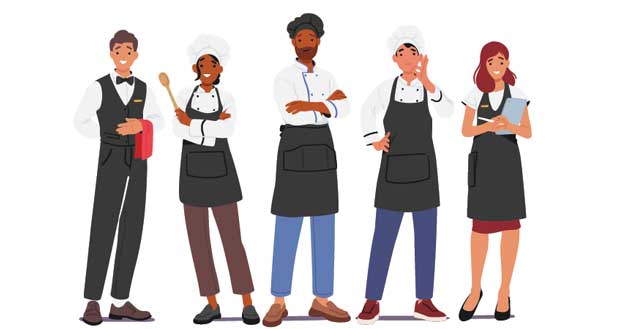 CATERING CONSULTANT’S VIEW
CATERING CONSULTANT’S VIEW
JULIAN FRIS,
DIRECTOR, NELLER DAVIES
The NIC increase is expected to substantially raise wage costs, particularly affecting workforce-intensive sectors like contract catering. For SMEs, already contending with rising costs, this could further squeeze profitability, limiting investment in sustainability, technology, staff development or just be able to bid for opportunities.
To address these challenges, the sector will need to look at operational efficiency. Caterers are streamlining operations, focusing on supply chain optimisation, waste reduction through refined menu designs and investing in energy-efficient equipment.
These efforts aim to lower costs while meeting growing demand for sustainable practices. However, achieving these goals often requires client buy-in, which may create contractual turbulence.
Some clients expect caterers to absorb these efficiencies, leading to pressure to deliver cost savings and fuelling the trend of mergers and acquisitions for economies of scale.
In addition, with labour costs forming a significant proportion of budgets, boosting workforce productivity is critical.
Strategies include targeted staff training, technology adoption to automate repetitive tasks and flexible staffing models aligned to demand. These efforts must also navigate changes from the Employment Rights Bill and consider the total cost of operations rather than focusing solely on labour costs.
Finally, price management will be crucial. Passing costs onto clients or consumers is generally avoided but may become necessary.
While renegotiation of contracts could reflect rising input costs, this is less feasible in the heavily regulated public sector. Innovation in cost management, supported by open client communication, is essential.
Collaborating on cost-sharing models and redesigning service levels could help balance quality with affordability though, as suggested, navigating restrictive public-sector contracts remains challenging.
There are significant risks when a cost focused approach is taken to catering. With contraction in the marketplace as suppliers must combine to survive, customer choice is reduced, standards drop, and we end up with an over-commoditised offer. This is something we already see with patient food service in the NHS and some schools where generally poorer quality products are served to meet an obligation.
Industry organisations such as the British Hospitality Association and FCSI are lobbying the government to reconsider the NIC rise or introduce mitigating measures, highlighting its potential disproportionate impact on the sector’s economic and employment contributions.
Despite these pressures, the sector remains optimistic and there remains strong demand for outsourced catering and the industry’s capacity for innovation. By proactively addressing challenges, collaborating with clients and staying focused on long-term objectives, UK contract caterers are well-positioned to sustain growth and remain a vital contributor to the economy.
As April 2025 approaches, the sector’s ability to adapt will not only safeguard profitability but also reinforce its role as a cornerstone of the UK’s workforce and economic recovery.
 CONTRACT CATERER MANAGING DIRECTOR’S VIEW
CONTRACT CATERER MANAGING DIRECTOR’S VIEW
ANGUS BRYDON,
MANAGING DIRECTOR, BM CATERERS
The pressures being placed on our industry come at a time when client confidence in our sector is strong. Employees are settling back into office and hybrid working arrangements, and clients are optimistic about the year ahead in 2025.
However, after most of our financial year budgets had been submitted, the Government announced a 1.2 per cent increase in employer National Insurance contributions. This late change impacts not only us but also our partners. In response, we’ve reached out to our clients to discuss the implications and explore collaborative ways to mitigate these additional costs.
Transparency has been key; we’re working closely with both customers and suppliers to identify cost efficiencies and ensure open communication. Many of our clients are long-standing partners, and they trust us to manage these challenges effectively.
Despite these pressures, we remain confident about the growth prospects for our sector. Previously, growth would have supported cost stability, but rising expenses now demand even greater effort to balance budgets. Our commitment to seasonality, a cornerstone of sustainability and cost efficiency, remains steadfast. By focusing on seasonal produce, we can continue to offer exceptional value to our clients while staying true to our principles.
Across the board, rising costs are impacting both clients and foodservice providers. In this climate, our priority is to maintain a competitive offering that delivers excellent value for money. We’re also tapping into the renewed confidence in our client base to drive sales forward. Careful stewardship of our clients’ budgets remains a top priority, and we are fully committed to justifying every cost as we navigate the current economic challenges together.
Innovation is another area we’re leveraging to create efficiencies for our clients. For example, we’re introducing AI-driven till systems that streamline payment processes and reduce queuing times. These advancements have been well-received, but we are mindful that our industry is fundamentally people driven. Technology and AI will always be tools to enhance, not replace, the exceptional service our team members provide.
Investing in our team is another critical focus area. By prioritising the development and retention of our staff, we aim to reduce reliance on costly agency workers. This approach not only helps control costs but also enhances the skills, knowledge, and consistency of our teams. Our retained team members bring a depth of familiarity with client sites and strong relationships that drive seamless service delivery.
As we look ahead, our commitment to innovation, sustainability, and exceptional client service remains unwavering. Together with our clients, we are finding solutions to these challenges while continuing to deliver outstanding hospitality experiences.





